Unit 6 Period 1
Unit 6 Period 1 Grammar 课内语法精讲-六年级英语上册(牛津上海版)

6. It takes sb. + 时间 + to do sth. 做某事花了某人多少时间 It took me half an hour to go over my lesson. 复习功课花了我半个
小时。 = I spent half an hour on my lesson.
7. a few, some, a lot of a few一些;some一些;a lot of许多 这些都是表示数量的单词或短语。a few用来修饰可数名词,表示肯定,意为“少数的;几 个;一些”。例如: I have a few books. 我有一些书。 some是不定量代词,意为“一些”,既可以修饰可数名词,也能修饰不可数名词,常用于肯 定句,当用在特殊疑问句中时表示渴望得到对方的肯定回答。例如: I'd like to have some milk for breakfast. 早餐我想喝一些牛奶。 -Would you like some water?你想要喝水吗? -No, thank you. 不,谢谢。 a lot of是一个形容词性短语,意为“许多,大量”,修饰可数名词或不可数名词,常用于肯 定句中。例如: There are a lot of trees in this park. 这个公园里有大量的树。 Tom earns a lot of money by hard work. 汤姆通过努力工作挣了许多钱。
Unit6 Going to school
1. be/live near some place 离/住得离某地近 My school is
_______ my home. 我家离学校很近。 I live _______ my
school. 我住得离学校很近。【答案】near
Unit 6 Turn right Period 1(教案)-2022-2023学年英语四年级上册

Unit 6 Turn rightPeriod 1 教案课程目标本节课是英语四年级上册的第六单元,通过本课的学习,学生将能够掌握以下知识点:•熟练掌握单词:turn right, go straight, turn left, traffic light;•能够正确使用指示方向的词语进行简单的指路;•能够通过老师展示的图片理解词汇的具体意思,并进行朗读;•了解交通规则,知道在何时使用交通灯。
教学过程导入新课1.教师向学生询问其周末参加了什么活动。
2.让学生描述自己离开家之前都会做些什么,引出今天的主题:路和交通。
讲解本单元新词汇1.展示单词卡片,让学生逐个朗读新单词。
2.教师带领学生学习新单词的意思及用法:–Turn right:向右转;–Go straight:直走;–Turn left:向左转;–Traffic light:交通灯。
3.完成课前准备作业:学生准备一张画有拐弯和交通灯的图片。
听故事学单词1.为学生播放一段故事,在故事中穿插出现了新单词,帮助学生更好地理解单词的使用场景。
2.让学生跟着故事情境,模仿故事中的表达方式,并在合适的地方使用新单词。
3.教师逐句导读,帮助学生理解故事内容,并提醒学生故事中新单词的使用。
指路小游戏1.分为两组,每组学生都有一张地图。
2.学生A学会了在地图上给B指路的基本表达方式,然后A将地图翻过来,B 向A询问该如何到达指定的位置,A用英语指路。
3.将两组学生交换地图和指路角色,玩家A变成了B,B变成了A。
交通灯红绿灯游戏1.首先,教师向学生简要介绍一下红绿灯规则。
2.然后,将学生分为两组,在教室中设置一些障碍物,教师充当交通灯,红灯时停下,绿灯时,学生可以行驶。
3.当学生行驶到路口时,教师可以改变交通灯的颜色,如果学生在红灯时继续行驶,则失去这次游戏的机会。
回顾及作业1.教师回顾本课学过的新单词和知识点,以及小组游戏中表现出色的同学。
2.让学生完成交通灯红绿灯游戏中未完成的部分,并完成一道作业题目:在家中,利用新单词描述自己家到学校的路线,以及中途要通过的路标或标志。
Unit_6_It's_raining!_(Period_One)AlMnlM
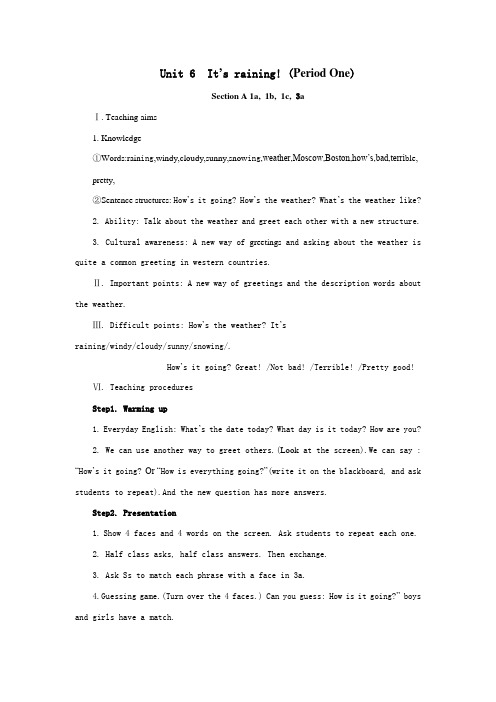
Unit 6 It’s raining! (Period One)Section A 1a,1b,1c, 3aⅠ. Teaching aims1. Knowledge①Words:rain ing,windy,cloudy,sunny,snow ing,weather,Moscow,Boston,how’s,bad,terri b le,pretty,②Sentence structures: How’s it going? How’s the weather? What’s the weather like?2. Ability: Talk about the weather and greet each other with a new structure.3. Cultural awareness: A new way of greetings and asking about the weather is quite a common greeting in western countries.Ⅱ. Important points: A new way of greetings and the description words about the weather.Ⅲ. Difficult points: How’s the weather? It’sraining/windy/cloudy/sunny/snowing/.How’s it going? Great! /Not bad! /Terrible! /Pretty good!Ⅵ. Teaching proceduresStep1. Warming up1.Everyday English: What’s the date today? What day is it today? How are you?2. We can use another way to greet others.(Look at the screen).We can say : “How’s it going? Or “How is everything going?”(write it on the blackboard, and ask students to repeat).And the new question has more answers.Step2. Presentation1.Show 4 faces and 4 words on the screen. Ask students to repeat each one.2. Half class asks, half class answers. Then exchange.3. Ask Ss to match each phrase with a face in 3a.4.Guessing game.(Turn over the 4 faces.) Can you guess: How is it going?” boys and girls have a match.Step3. Presentation1.Let one student ask me: How’s it going? I may answer like this: “pretty good! Because it’s sunny. The weather is sunny.”(look at the screen, Show a picture of sun) Ask them: How’s the weather? Get them to answer like: It’s sunny. Go on with other kinds of weather: snowing, raining, cloudy, windy.2. Game: Front and backGive the cards to five students. eg. The first time the teacher says “cloudy”, the student who hold the card “cloudy”come to the front; the second time the teacher says “cloudy”, the student go back.3. Match the words with the pictures.Step4. Practice1. Look at the map. Ask and answer:How is the weather in…?It’s …2. These are cities of China. Let’s see other cities in the world. The first, let’s recognize the names of the cities.Moscow is in Russia. Toronto is in Canada. Boston is in the USA.3. Listen to the tape: How is the weather in these cities? Write the city names in the boxes above.4. Check the answer.5.Chainwork: Every group raise a question. Other groups answer it according to the pictures.Step5. PairworkPractice the conversation on the screen , then make your own conversation Step6.Grammer:(look at the screen, read the words in the left column after the teacher)S un,rain,cloud,wind,snow, they are nouns, W e can add a “y” at the end ofthe words, or double write the last letter then add a “y”, we can change them into adjectives.Step7.ExercisesStep8.Summary教学反思大畈中学陈伟迪本课以训练学生的听说能力为主要目标,以描述天气为中心话题,为本单元后面学习用现在进行时态描述不同天气背景下人的活动做铺垫.本课的教学内容分为两大块:一是见面问候语”How is it going?”的句型问答, 通过学习招呼用语, 培养关爱他人意识,学会如何与人友好相处;二是”How is the weather?”的句型问答,通过课文教学引导学生关注天气情况,了解其它国家地理气候和人文风俗.本课的教学过程分为六个步骤:1.以旧引新,导入话题2.游戏活动,巩固词汇3.点击地图,谈论天气4.听读课文,仿编对话5.语法讲解,巩固练习6.小结内容, 品德教育本课的教学在以下几个方面比较成功:1.操练形式多样在句型的操练过程中,有教师面向全体学生的问答,有师生两人间的问答,有学生小组间的问答,有学生两人问答,还有学生四人的表演.正是采取了这种由面到点, 一步步深入的操练方式,学生才能达到对新句型从陌生到熟悉,从不能上口到流利表达的程度.2.游戏活动多彩游戏活动之一是在学生认读描述人的状态的形容词后,教师将生词卡背对学生,采用男女生竞赛猜词的游戏,强化学生的单词记忆.游戏活动之二是在学生初步感知了描述天气的5个形容词后,教师让5名学生在台上做听词迈步并重复单词的游戏,既让台上学生训练了听,练习了读,也让台下学生在轻松自由的气氛中巩固了记忆.游戏活动的妙处在于能让学生在乐中学,在玩中记,既有激烈的竞争,也有开心的欢笑,这不正是我们的课堂所要追求的吗?3.教学辅助手段丰富课前准备的质量很大程度上决定了课堂教学的质量.为了提高学生的学习兴趣,也为了让学生获得直观、真实的感官体验,教师自制了9张单词图画卡片,还制作了精美的课件.单词图画卡片是本课游戏环节的必需品,而精心制作的课件,为语言教学提供了丰富的学习资源,使教材的思想性和艺术性结合在一起,创造出与教授内容相关的丰富生动的语言环境.比如“看地图,谈天气”这一环节中,点击中国地图上某一城市,就出现该城市的天气面貌图片.学生边看边用所学句型问答,觉得既新鲜又似曾相识,因为这就是平时与大家生活息息相关的“天气预报”栏目.本课的教学过程中也存在一些不足之处:一是教学时间把握不够准确,课堂的节奏前紧后松.改进的方法,比如游戏环节中,可以让每个游戏多做几轮,老师当发令官再让学生当发令官,让学生参与的面更广,避免一晃而过,流于表面的现象,让学生玩得尽兴,记得牢固.再如,新句型呈现以后,教师带读次数太少,学生跟读重复有些不到位,所以后来学生两人一对编对话时,有些学生感到困难.二是板书设计有些随意.虽然板书突出了难点但对于教学内容的概括不够全面,也不太美观,显得欠考虑.总的说来,在本课的教学中,教师做了以下几个方面的尝试:从面向部分学生到面向全体学生的转变;从重传授向重学生主动学习的转变;从重语言知识讲解向重学生参与、感知的语言学习过程转变;从重教师的单向的信息输出向师生互动、生生互动的多项信息交流转变;从重单一的课本教学向开发利用课程资源,拓宽学生的学习渠道转变,并取得了较好的教学效果.。
新目标英语七年级上册unit6Period1公开课课件

02
实施
03
04
安排5-10分钟时间,让学生 提问。
教师解答学生的疑问,并引导 其他学生参与讨论。
Teacher's Q&A session
目的: 教师解答学生疑惑,提供个性化指导。 教师收集学生的问题,挑选有代表性的进行解答。
实施
对于共性问题,教师可组织小组讨论或邀请学生分享经 验。
Classroom interactive games
Try to understand the cultural background and context of the text.
Practice listening, speaking, writing and translation to
improve English proficiency.
深入解析语法规则
通过讲解、演示和练习,使学生深入理解Unit6涉及的语法知识点,如现在进行时、一般将来时等,并能在实际语境中运用。
Text Analysis
培养阅读理解能力
通过对Unit6的课文进行深入分析,引导学生理解文章的主题、结构和语言特点,同时提高学生的阅 读速度和理解能力。
03 teaching method
培养批判性思维
学生在讨论中学会倾听、思考、表 达自己的观点,培养批判性思维能 力。
增强沟通技巧
小组讨论让学生学会与人沟通、协 商、达成共识,提高沟通技巧。
04 Teaching interaction
Student questioning session
01
目的: 鼓励学生主动提问,促 进知识内化。
Reading and Understanding: A Trip to New York City
新目标英语九年级上人教版Unit6period1说课稿
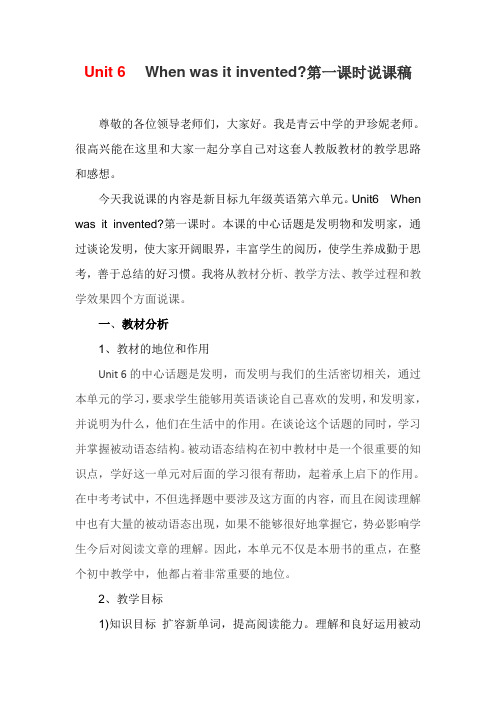
Unit 6 When was it invented?第一课时说课稿尊敬的各位领导老师们,大家好。
我是青云中学的尹珍妮老师。
很高兴能在这里和大家一起分享自己对这套人教版教材的教学思路和感想。
今天我说课的内容是新目标九年级英语第六单元。
Unit6 When was it invented?第一课时。
本课的中心话题是发明物和发明家,通过谈论发明,使大家开阔眼界,丰富学生的阅历,使学生养成勤于思考,善于总结的好习惯。
我将从教材分析、教学方法、教学过程和教学效果四个方面说课。
一、教材分析1、教材的地位和作用Unit 6的中心话题是发明,而发明与我们的生活密切相关,通过本单元的学习,要求学生能够用英语谈论自己喜欢的发明,和发明家,并说明为什么,他们在生活中的作用。
在谈论这个话题的同时,学习并掌握被动语态结构。
被动语态结构在初中教材中是一个很重要的知识点,学好这一单元对后面的学习很有帮助,起着承上启下的作用。
在中考考试中,不但选择题中要涉及这方面的内容,而且在阅读理解中也有大量的被动语态出现,如果不能够很好地掌握它,势必影响学生今后对阅读文章的理解。
因此,本单元不仅是本册书的重点,在整个初中教学中,他都占着非常重要的地位。
2、教学目标1)知识目标扩容新单词,提高阅读能力。
理解和良好运用被动语态。
2)技能目标能谈论重要发明的历史及用途,能针对各项发明的用处及特点,发表自己的看法,并说明理由。
3)情感目标使学生懂得人类的科学发明创造了丰富的物质文明。
培养学生的创造发明的能力和愿望。
3、教学重点掌握一般过去时的被动语态。
4、教学难点弄清主动语态与被动语态的差异,通过练习和运用加以巩固。
二、教法学法1、教法:采取”任务型”教学法。
教师根据本节课内容,安排合适的任务,让学生在完成任务的过程中达到本节课所拟定的目标。
2、学法:任务型。
让学生通过完成课前找资料、上课积极参与、讨论,课后进行巩固和迁移等任务,来达到拟定的目标。
四年级上册英语教学设计-Unit 6 At the snack bar Period1 Story

四年级上册英语教学设计 - Unit 6 At the snack bar Period1Story time&Fun time-译林版一、教学目标1.知识目标1.掌握单词和短语:need, thirsty, hungry, want, apple juice, orange juice, water, cola, snack bar, please, what would you like?2.能听懂、会说、会读句型:I need a drink. I’m thirsty. I’m hungry. I want some juice/snack. Can I have some …? What would you like?2.能力目标1.能听、说、读、写本单元的语汇和句子。
2.通过讲故事和游戏巩固本单元的语言知识。
3.情感目标1.培养学生独立、自信和礼貌的习惯。
2.通过游戏和合作学习,增强团结协作意识。
二、教学重难点1.重点1.教授旅行者故事,让学生懂得如何独立。
2.教授本单元的语言知识,并巩固运用。
2.难点通过讲故事、游戏和合作学习,让学生对本单元的语言知识有更深入的了解和理解。
三、教学过程1. Warming up1.老师问学生:“Do you like snacks?”学生回答。
2.老师展示图片并讲解单词 snack bar 和 snack, 并练习读音。
2. Pre-listening1.老师出示如图所示的小话本,并询问学生旅游时需要什么。
2.老师出示apples、oranges、water、snack 等图片,并展示句型:“I need adrink/snack”,“I’m thirsty/hungry”,“Can I have some…?”。
3.老师让学生模仿句型。
3. Listening1.老师讲述旅行者的故事,并和学生一起讨论旅行者需要什么。
2.老师提问学生需要一些什么,让学生练习句型:“I need a drink/snack”,“I’m thirsty/hungry”,“Can I have some…?”。
六年级上册英语教案-Unit6Keepourcityclean(period1)译林三起
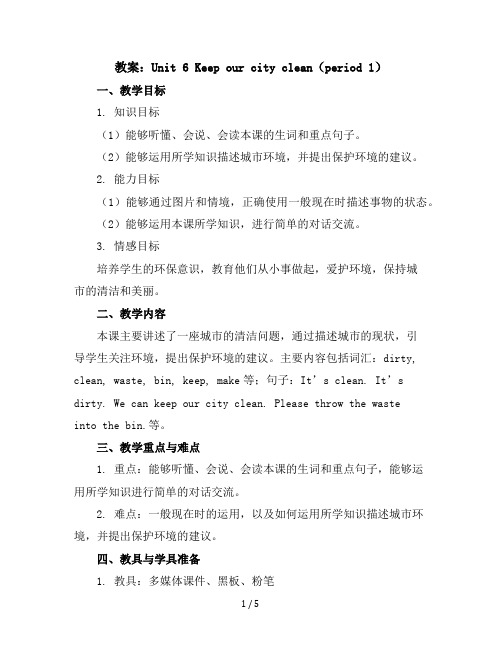
教案:Unit 6 Keep our city clean(period 1)一、教学目标1. 知识目标(1)能够听懂、会说、会读本课的生词和重点句子。
(2)能够运用所学知识描述城市环境,并提出保护环境的建议。
2. 能力目标(1)能够通过图片和情境,正确使用一般现在时描述事物的状态。
(2)能够运用本课所学知识,进行简单的对话交流。
3. 情感目标培养学生的环保意识,教育他们从小事做起,爱护环境,保持城市的清洁和美丽。
二、教学内容本课主要讲述了一座城市的清洁问题,通过描述城市的现状,引导学生关注环境,提出保护环境的建议。
主要内容包括词汇:dirty, clean, waste, bin, keep, make等;句子:It’s clean. It’s dirty. We can keep our city clean. Please throw the wasteinto the bin.等。
三、教学重点与难点1. 重点:能够听懂、会说、会读本课的生词和重点句子,能够运用所学知识进行简单的对话交流。
2. 难点:一般现在时的运用,以及如何运用所学知识描述城市环境,并提出保护环境的建议。
四、教具与学具准备1. 教具:多媒体课件、黑板、粉笔2. 学具:课本、练习册、文具五、教学过程1. 导入(1)复习导入:通过复习上一单元的内容,引导学生进入学习状态。
(2)情境导入:展示一张干净的城市图片,引导学生描述城市的清洁状况,引出本课主题。
2. 教学新课(1)呈现生词:通过图片和情境,引导学生学习本课的生词,如dirty, clean, waste, bin等。
(2)教授句子:通过情境和例句,教授本课的重点句子,如It’s clean. It’s dirty. We can keep our city clean. Please throw the waste into the bin.等。
3. 练习巩固(1)小组活动:学生分小组,用所学知识描述一组图片,并提出保护环境的建议。
Unit 6,Period1

Make a survey
A: What kind of music do you like?
B: I like music that…
Report: In my group, ×××likes music that…
点击中考:
1. I prefer songs ____ popular.(2007威海) A. that is B. that are C. who is
lyrics
歌词
A: What kind of music do you like? I like music . It has great lyrics.
B:I like music that______________. has great lyrics.
有美妙的歌词
A: What kind of music do you like? I love music. The music is quiet and gentle.
B:I love music that is quiet and gentle .
轻柔的,柔和的
A: What kind of music do you like? I like music.
有活力的 is loud and energetic music that ________________ .
A: What kind of music do you like? B: I like music that ……What about you ? A: I prefer music that … that I can sing along with. that is quiet and gentle. that is loud and energetic. that I can dance to. that has great lyrics. that makes me happy.
人教版新目标版七年级英语上册 Unit 6 Do you like bananas 教案

Unit 6 Do you like bananasUnit 6 Do you like bananas? 教学设计⑥1.复习词汇:like 2.词汇:banana ,hamburger ,tomato ,broccoli ,French fries , orange ,ice cream ,salad ,strawberry ,breakfast ,lunch , dinner ,egg ,apple ,chicken ,fruit ,vegetable3.句型:Do you/they like salad? Yes ,I/they do ./No ,I /they don ’t .Does he/she like salad? Yes ,he/she does ./No ,he/she doesn ’t.I/They like oranges . I/They don ’t like oranges .He/She likes ice cream . He/She doesn ’t like bananas .语法重点:动词like 一般现在时的肯定句、否定句和一般疑问句的用法以及肯定与否定的回答。
Step Ⅱ Exercise 随堂练习设计(1)翻译填空1.你喜欢吃香蕉吗? _______ you __________ bananas?2.艾米丽的哥哥不喜欢吃草莓。
Emily’s brother ________ _______strawberries .3.凯特早餐吃鱼吗? ______ Kate like fish ________ breakfast?4.你晚饭常常吃什么? What _______ you usually have ______ _________?5.我叔叔常常吃冰淇淋作甜食。
My uncle usually ______ ice cream ______ dessert .(2) 用所给词的适当形式填空1. Bob (like) French fries.2. I want some ______(tomato) for dinner3. Would you like some ______(salad)?4. How ______(much) eggs do you have?5. You can see ________ (lot) of pictures in his room.(3) 任务型阅读:根据表格内容完成下面的短文NameJoy Smith AgeFifteenlike SportFoodColoryellowDislike Sport FoodColor red Joy is a boy. He is fifteen years old. His last name is __________. Hoy is his _________ name. He likes to play ___________. He doesn’t like to play __________.。
新外研版选择性必修一大串讲:Unit 6Period_1知识点梳理学案

Unit 6 Nurturing naturePeriod 1 Starting out and Understanding ideas 知识点梳理I.词汇精讲·对接高考知识点1.【原句】重点词汇...“railways like massive dragons are winding among the mountains”...……铁路就像巨龙蜿蜒在大山之中……massive adj.巨大的【考点归纳】mass n.块,团;大量,许多a mass of/masses of大量的,许多的the masses群众,平民百姓【例句】①The explosion made a massive hole in the ground.爆炸在地面留下了一个巨大的洞。
②The hill appeared as a black mass in the distance.那座小山在远处显得一片漆黑。
【对接高考】·完成句子The paper was covered with a mass of/masses of figures.纸上写满了密密麻麻的数字。
知识点2.【原句】Located at over 5,000 metres above sea level,this is the highest railway station in the world.位于海平面以上5 000多米处,这是世界上海拔最高的火车站。
locate vt.使位于,使坐落于……【考点归纳】※be located in/on/at...坐落于……※location n.地点,位置【例句】The company located its branch office in the suburbs.这家公司在郊区设立了办事处。
【对接高考】·单句语法填空①The old temple is located(locate) at the foot of a mountain.这座古庙位于山脚下。
苏教版译林小学英语课课练 六年级上册 【第3版】参考答案
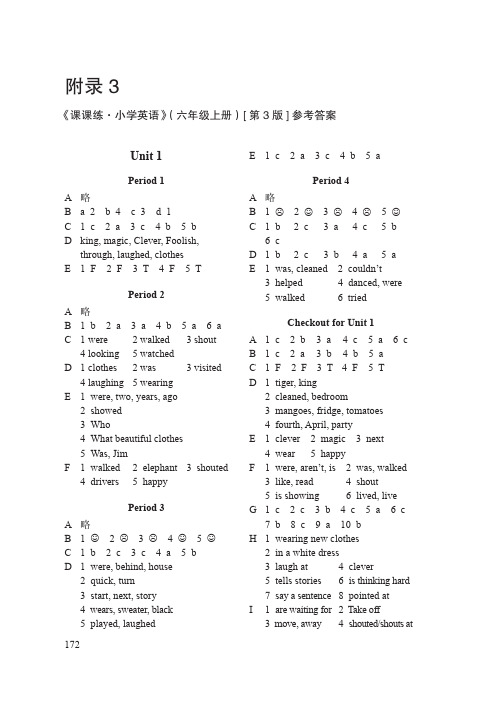
Unit 1Period 1A 略B a 2 b 4 c 3 d 1C 1 c 2 a 3 c 4 b 5 bD k ing, magic, Clever, Foolish,through, laughed, clothesE 1F 2 F 3 T 4 F 5 TPeriod 2A 略B 1 b 2 a 3 a 4 b 5 a 6 aC 1 were 2 walked 3 shout4 looking5 watchedD 1 clothes 2 was 3 visited4 laughing5 wearingE 1 were, two, years, ago2 showed3 Who4 What beautiful clothes5 Was, JimF 1 walked 2 elephant 3 shouted4 drivers5 happyPeriod 3A 略B 1 ☺ 2 ☹ 3 ☹ 4 ☺ 5 ☺C 1 b 2 c 3 c 4 a 5 bD 1 were, behind, house2 quick, turn3 start, next, story4 wears, sweater, black5 played, laughed E 1 c 2 a 3 c 4 b 5 aPeriod 4A 略B 1 ☹ 2 ☺ 3 ☹ 4 ☹ 5 ☺C 1 b 2 c 3 a 4 c 5 b6 cD 1 b 2 c 3 b 4 a 5 aE 1 was, cleaned 2 couldn’t3 helped4 danced, were5 walked6 triedCheckout for Unit 1A 1 c 2 b 3 a 4 c 5 a 6 cB 1 c 2 a 3 b 4 b 5 aC 1 F 2 F 3 T 4 F 5 TD 1 tiger, king2 cleaned, bedroom3 mangoes, fridge, tomatoes4 fourth, April, partyE 1 clever 2 magic 3 next4 wear5 happyF 1 were, aren’t, is 2 was, walked3 like, read4 shout5 is showing6 lived, liveG 1 c 2 c 3 b 4 c 5 a 6 c7 b 8 c 9 a 10 bH 1 wearing new clothes2 in a white dress3 laugh at4 clever5 tells stories6 is thinking hard7 say a sentence 8 pointed atI 1 are waiting for 2 Take off3 move, away4 shouted/shouts at附录3《课课练 · 小学英语》(六年级上册)[第3版]参考答案1725 try, on6 looked at7 am looking for 8 have toJ 1 good, magic2 helped, liked/loved3 visited, for4 become, afraidK w as, sad, Why, river, help, ball, happy L 1 F 2 T 3 F 4 T 5 TM 略Unit 2Period 1A 略B 1 a 2 b 3 a 4 a 5 a 6 bC c e b d aD 1 bike 2 showed 3 windy4 became5 drinksE W ednesday, was, cooked, brought,birthday, saw, ran, gave, interesting, werePeriod 2A 略B 1 ☹ 2 ☹ 3 ☺ 4 ☹ 5 ☹C 1 could 2 told 3 flying4 picked5 watches, wentD 1 b 2 c 3 c 4 b 5 c 6 aE 1-a-g 2-d-h 3-c-f 4-b-ePeriod 3A 略B p lay, first, three, cloudy, walked,turn, sunny, cookedC 1 sunny 2 were 3 is, gave4 went5 meetsD 1 wasn’t 2 lost 3 is, climbing4 were, some, cakes5 couldn’tE 1 ☺ 2 ☺ 3 ☹ 4 ☹F 1 b 2 b 3 a 4 c 5 cPeriod 4A 略B 1 a 2 c 3 c 4 b 5 aC f, d, a, g, e, c, bD h ad, got, was, played, went,brought, found, were, rainy, goE 略Checkout for Unit 2A 1 c 2 a 3 b 4 b 5 bB a 3 b 1 c 2 d 4C 1 T 2 T 3 F 4 F 5 FD a t, weekends, library, reading,shopping, last, weekend, zoo,people, lost, helped, findE 1 rainy 2 interesting, watch3 sunny, windy, flying4 climbed5 bees6 picnic, drinksF 1 doesn’t like 2 became, fly3 came, got4 brought5 flew6 is singing, sings, singingG 1 b 2 c 3 a 4 c 5 b 6 c7 a 8 c 9 c 10 aH 1 river, afraid 2 is, can3 came, can’t4 or, try, not, rightI 1 b 2 c 3 c 4 a 5 b 6 a7 a 8 bJ 1 It’s Daniella’s.2 She’s twelve.3 It’s on the fifth of November.4 It started at 2:30 p.m.5 It was at Daniella’s house.K 1 b 2 a 3 a 4 c 5 cL 略Unit 3Period 1A 略173B 1 ☹ 2 ☹ 3 ☺ 4 ☺ 5 ☺6 ☹C b, c, d, e, a, fD 1 was 2 did 3 Is 4 flew5 Were6 Did7 lose, didE 1 c 2 b 3 b 4 a 5 aF w ith, picked, big, went, caught,give, called, wasn’t, cooked, atePeriod 2A 略B a 4 b 1 c 3 d 5 e 2 f 6C 1 c 2 b 3 e 4 f 5 d 6 a7 gD 1 d o, homework, did, watched,played, football2 w ere, was, did, saw, ducks, Did,smallE 1 a 2 c 3 a 4 c 5 c 6 b7 bPeriod 3A 略B 1 b 2 c 3 a 4 c 5 b 6 cC 1 went 2 ate 3 was 4 pick5 have6 car7 wore8 did, doD d, b, a, c, eE 1 a 2 c 3 b 4 c 5 aPeriod 4A 略B 1 c 2 b 3 a 4 c 5 bC 1 pick, orange, from, tree2 Did, those, cups3 were, first4 National, Day, holiday5 went, Great, WallD 1 b 2 c 3 a 4 b 5 c 6 bE 1 ☹ 2 ☺ 3 ☺ 4 ☹ 5 ☹F bought presents/went shopping,saw Father Christmas,waited for presents/slept/went to bed,got/opened their presents,had a big lunch/dinnerCheckout for Unit 3A 1 c 2 a 3 b 4 b 5 bB 1 b 2 b 3 c 4 a 5 cC 1 c 2 c 3 b 4 b 5 aD c lever, eleven, Maths, Science,swimming, playing, table, tennis,Russia, placesE 1 holiday2 museums, interesting3 fever, hospital4 wear5 foolish, anything6 weather, windyF 1 rains, didn’t rain 2 is coming3 was, were, ate4 teaches5 to read6 call7 is, was, is, walkingG 1 c 2 b 3 a 4 a 5 b 6 c7 c 8 b 9 c 10 cH w ere, computer, did, Did, chatted,talk, about, got, presents, visitedI 1 c 2 a 3 b 4 b 5 a 6 c7 b 8 cJ 1 F 2 T 3 F 4 F 5 TK 1 She lived on a farm.2 H er daughter worked at a cinemain the city.3 She got there by train.4 S he saw a lot of interestingthings.5 Yes, she did.6 No, she didn’t.L 略174Unit 4Period 1A 略B 1 b 2 a 3 b 4 b 5 c 6 aC 1 F 2 F 3 T 4 T 5 FD 1 newspaper 2 e-book 3 year4 mobile phone5 radio6 office7 schoolE 1 write 2 play 3 used, call4 had5 do6 hasF c ouldn’t, could, read, didn’t, play,goodPeriod 2A 略B 1 ☺ 2 ☺ 3 ☹ 4 ☹ 5 ☹6 ☺C 1 c 2 b 3 c 4 c 5 a 6 b7 bD h ad, wrote, was, can, is, are, read,writeE 1 c 2 b 3 a 4 b 5 a 6 bPeriod 3A 略B 1 a 2 a 3 b 4 c 5 a 6 bC 1 on 2 of 3 with 4 for5 in6 to7 from8 atD e, c, b, a, dE 1 was, office, ago2 read, newspapers, yesterday3 news, Internet4 make, a, sentenceF 1 a 2 d 3 c 4 bPeriod 4A 略B 1 ☹ 2 ☹ 3 ☺ 4 ☺ 5 ☹C 1 c 2 b 3 a 4 c 5 b 6 cD v isited, brought, were, were, talked,made, went, hadE 1 T 2F 3 T 4 T 5 FF 略Checkout for Unit 4A 1 ☹ 2 ☺ 3 ☹ 4 ☺ 5 ☹6 ☺B Tim: walk, canGrandparents: newspapers, newsMrs Brown: school, e-friendsC 1 a 2 a 3 c 4 a 5 bD a go, draw, write, helps, cook, news,e-books, emailsE 1 weren’t, are 2 did, wanted3 couldn’t, can4 fly, flew5 read, watchesF 1 b 2 c 3 b 4 b 5 b 6 c7 c 8 b 9 a 10 bG 1 Look out of2 read newspapers3 go on4 listened to the radio5 all over the world6 makes friends7 make a sentence8 do shoppingH 1 j 2 e 3 a 4 c 5 b 6 d7 f 8 g 9 h 10 iI 1 Where, did 2 ate3 What, could, do4 any, weren’t J 1 c 2 c 3 b 4 b5 a6 b7 c 8 bK 1 T 2 T 3 F 4 T 5 F 6 F L 1 H e is playing games on thecomputer.2 No, he wasn’t.3 H e often watches cartoons and175films on the Internet.4 Yes, we could.M略Unit 5Period 1A 略B 1 d 2 a 3 c 4 bC 1 ☹ 2 ☺ 3 ☹ 4 ☹ 5 ☺D 1 f 2 c 3 a 4 b 5 d 6 eE 1 No parking. 2 No littering.3 Wet floor.4 No smoking.F 1 shopping centre 2 signs3 mean, means4 take, into5 smoke6 wanted, juice7 should 8 bookshopPeriod 2A 略B a 7 b 9 c 1 d 8 e 3 f 4g 6 h 5 i 2C s igns, do, means, shouldn’t/can’t,take, smoking, smokeD 1 mean, means 2 off, on3 climbing, climb4 smoking5 swim6 careful7 fishing, fishE d b c a eF 1 a 2 b 3 b 4 b 5 aPeriod 3A 略B 1 a 2 a 3 b 4 c 5 aC 1 c 2 c 3 b 4 b 5 c 6 bD 1 sign, mean, What, means, smoke2 T here’s/Here’s, mean, shouldn’t/can’t, speakE 1 c 2 b 3 a 4 c 5 b 6 bPeriod 4A 略B 1 T 2 F 3 F 4 F 5 TC 1 at, shopping, centre2 careful, around3 take, into4 mean, go, in5 someone, smellD 1 does, mean 2 Don’t, smoke3 you, any4 What, are5 shouldn’t, litterE a 2 b 1 c 3F 略Checkout for Unit 5A a 3 b 1 c 6 d 4 e 8 f 7g 2 h 5B 1 c 2 a 3 c 4 b 5 cC 1 F 2 T 3 F 4 TD f our, touch, Saturday, bees, walked,catch, came, pointed, shouldn’t, againE 1 T-shirt 2 rubber 3 hear4 art5 teaF 1 reading, about2 fly, Danger3 throw, put4 matter, tired/thirsty, hungry/hot5 shout, sleeping6 aroundG 1 c 2 a 3 b 4 c 5 c 6 c7 a 8 c 9 b 10 cH 1 a lot of/many signs2 Be careful3 walks on, shopping centre4 No smoking5 on an outing6 eat or drink7 fruit shop, clothes shopI 1 c 2 a 3 b 4 e 5 f 6 d J 1 w atch/see, with, take, cinema, eating, drinking1762 s wimming, idea, lake, in, near/by, means/saysK l ook, saw, climbed, picked, pears, jumped, ran, Every, began, afterL 1 F 2 F 3 T 4 T 5 FM 略Unit 6Period 1A 略B a 4 b 2 c 1 d 3 e 5 f 6C 1 dirty, dead 2 rubbish, messy3 keep, bins4 metro, air5 plantD 1 c 2 b 3 a 4 dE 1 away 2 help, air 3 rubbish4 clean5 dirtyF 3 2 1 5 6 4 7Period 2A 略B 1 b 2 a 3 d 4 cC 1 makes, make 2 keep, take3 move4 factories5 walkD 1 d irty, rubbish, dead, put/throw,bins/bin2 makes, cars, factories, trees, walkE 1 goes, on 2 walked, home3 What, made4 cartoons, make5 do, toF dirty, are, around, rubbish, cleanPeriod 3A 略B 1 T 2 F 3 F 4 T 5 FC 1 a 2 c 3 c 4 b 5 a 6 cD s chools, Is, isn’t, clean, dirty, throw,stop, put E 1 F 2 T 3 F 4 F 5 FPeriod 4A 略B 1 c 2 b 3 a 4 a 5 bC 1 e 2 c 3 b 4 a 5 dD 1 makes, dirty, rubbish, bin/bins2 keep, clean, trees3 throw, on, fall4 sweep, clean5 walk, toE 略Checkout for Unit 6A 1 a 2 b 3 b 4 c 5 b 6 aB a1 b 5 c 4 d 2 e 3 f 6C 1 c 2 b 3 b 4 c 5 bD t own, tall, trees, flowers, Behind,water, clean, swim, air, livingE 1 ↗↘ 2 ↗↘ 3 ↘↘F 1 pictures of our city2 Black smoke from factories3 dirty and messy4 t ake a bus to school/go to schoolby bus5 k eep the library clean, eat ordrink6 m ove that factory away, plantmore treesG 1 c 2 b 3 a 4 b 5 c 6 c7 b 8 c 9 a 10 cH 1 i 2 h 3 a 4 e 5 j 6 d7 f 8 g 9 b 10 cI b edroom, messy, dirty, toys, Don’t,make, floor, Clean, First, pick,Next, FinallyJ 1 c 2 b 3 a 4 c 5 cK 1 F 2 T 3 T 4 T 5 FL 略177Unit 7Period 1A 略B 1 b 2 a 3 a 4 b 5 b 6 bC 1 water, clean2 coal, oil, Cars3 Wood, clean4 bags, bottles, bad, paper, glassD 1 reuse and save2 useful3 comes from, cut down4 protect5 wasteE 1 b 2 e 3 d 4 a 5 cF 1 much, oil 2 reuse3 drives4 other5 glass, many6 is making/doing7 protect, keepPeriod 2A 略B a 3 b 6 c 4 d 1 e 5 f 2C 1 draw 2 comes 3 smoke4 is5 useful, useD 1 c 2 e 3 a 4 b 5 dE 1 too, much2 use, to, make, chairs3 too, cold, take, off4 can/should, we, do, to5 of, oilF 1 T 2 F 3 F 4 T 5 FPeriod 3A 略B 1 b 2 c 3 a 4 c 5 cC 1 c 2 c 3 a 4 b 5 a 6 cD d oing, home, April, make, draw,flowers E 1 b 2 c 3 b 4 a 5 cPeriod 4A 略B d rive, bad, dirty, use, much, rivers,fish, trees, clean, helpC 1 b 2 e 3 a 4 c 5 dD 1 Can, reuse 2 should, not3 What, a4 What, to5 walks, to6 What, doE 1 c 2 b 3 c 4 a 5 b 6 cCheckout for Unit 7A 1 a 2 b 3 c 4 a 5 aB a 5 b 1 c 6 d 3 e 4 f 2C 1 a 2 a 3 b 4 b 5 cD e asy, rubbish, bin, save, glass,paper, warm, dirty, world, beautifulE 1 b wood 2 a water3 c pencils4 d plastic5 e paperF 1 park 2 save3 three, second4 watching, to watch5 Did6 messy7 makes, us 8 uses9 our, their 10 use, driveG 1 c 2 c 3 b 4 c 5 c 6 a7 b 8 b 9 a 10 cH 1 d oing, throwing, skin, can’t, put,bin2 c ut, many, save/protect, clean,Wood, What, make, otherI g oing, every, bring, fly, boating/biking, show, collected, paper,clothes, dressesJ 略K 1 F 2 T 3 T 4 T 5 FL 略178Unit 8Period 1A 略B 1 c 2 b 3 b 4 a 5 aC 1 b 2 b 3 a 4 c 5 cD 1 c 2 b 3 b 4 b 5 c 6 cE f ood, When, At, make, can, Who,with, eatPeriod 2A 略B 1 ☹ 2 ☹ 3 ☺ 4 ☺ 5 ☹6 ☹C 1 b 2 e 3 d 4 c 5 aD 1 is, coming, very, excited2 New, Year’s, Day, visit, friends3 to, be, next, going, to4 g oing, to, do, moon, cakes,watch, the, moonE 1 c 2 a 3 b 4 b 5 c 6 aPeriod 3A 略B 1 b 2 b 3 c 4 a 5 cC 1 is2 are going to watch3 is cooking4 visited5 is coming, makeD 1 z oo:cool, too, moon, food, school,room, bedroom2 book: cook, good, foot, look, woodE 1 c 2 b 3 c 4 a 5 bPeriod 4A 略B 1 ☹ 2 ☺ 3 ☺ 4 ☹ 5 ☺C c a b dD 1 Are, going2 What, does, do3 give, to4 When, are, going5 What, going, to, doE very, in, big, watch, moon, eat, haveF 略Checkout for Unit 8A 1 b 2 c 3 a 4 a 5 aB 1 b 2 c 3 d 4 e 5 aC 1 c 2 c 3 b 4 a 5 aD 1 weekend, watched2 buy, presents3 got, excited4 holiday5 reading, books6 rich, housesE 1 bought lots of food2 O n the second day of ChineseNew Year3 have a big dinner4 watched a lion dance5 cooking jiaozi6 Happy Chinese New Year7 t alking about/discussing theirholiday plans8 make nice/yummy cakes9 g et your email/get an email fromyou10 reading an English bookF 1 c 2 b 3 e 4 a 5 f 6 h7 d 8 gG 1 got, excited2 is going to buy, buying3 is cooking4 are going to visit5 watchH 1 c 2 b 3 a 4 a 5 b 6 b1797 b 8 c 9 a 10 bI m ost, call, January, February, clean,buy, dinner, light, didn’t, protectJ 1 W e can see the film at Red Star Cinema.2 T he film starts at seven fifteen inthe evening.3 No, we can’t.4 W e shouldn’t litter or smoke inthe cinema.5 They are sixty-five yuan.K 略180。
鲁教版五四制八年级下册英语unit6 习题课件 Period 1 Section A (1a-2d)
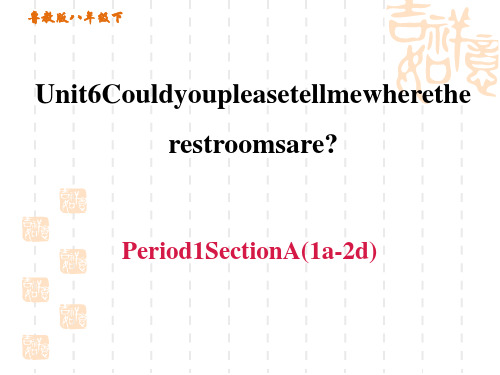
13. 我们的时间很充足, 用不着太急促。
Wehaveplentyoftime.
There'snoneed________________. torush
14. 大会在国歌声中开始。 Themeeting_____s_t_a_rt_e_d_w__it_h__thenationalsong.
【点拨】startwith意为“以……开始”。根据句 意可知用一般过去时。
【点拨】考查交际用语。Wouldyoupleasedosth. ?表示 请求对方做某事。句意为“——请问你能帮我把门关上 吗?外面太冷了。——当然可以”。故选A。
3.—Wouldyoupleasehelpmemovethisdesk? —______B__. A. OfcoursenotB. Certainly C. IagreewithyouD. IamOK
8. Sleepingisapopularwaytorelax______sBtudents. A. onB. amongC. aboutD. between
【点拨】句意为“在学生之间睡觉是一种流行 的放松方式”。由句意可知是在三个或三个以 上的学生之间。
9.—
AreyouwatchingthefootballmatchesoftheWorldC
题组专训
答案呈现
1B 2A 3B 4 whento
6A 7B 8B 9D
10 C 11 rushedto; inarush 12 rushing
5 whichdresstochoose/whichdressIwill/shouldchoose
1A 2D 3A 4C 5B
ቤተ መጻሕፍቲ ባይዱ
课后巩固
答案呈现
人教版七年级下册英语Unit 6 Period 1 Section A(1a-2d)
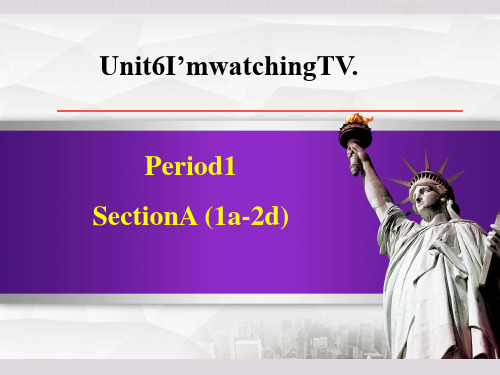
2cRole-playtheconversationin2b.
2dRole-playtheconversation.
Jenny:Hello? ThisisJenny. ⑥ Laura:Hi, Jenny. It'sLaurahere. Jenny:Oh, hi, Laura. Whatareyoudoing? Laura:Notmuch. ⑦I'mjustwashingmyclothes. Whataboutyou?
返回
中考在线2:根据句意及所给的首字母提示, 补全单词。 It’sagoodhabittowhandsbeforemeals. [海南]
ash
⑤Doyouwanttogotothemovies?
gofishinggo去to钓th鱼emgooshvoiepsp去ing看去电购影物 单数形式:gotoamovie
2bListenagain. Fillintheblanks.
Jack: Hello, Steve.
Steve: Hi, Jack.
Jack: Whata_re______ dyooiung________, Steve?
Steve: I'mw_a_tc_h_in_g_T_V_______. What about
you? listeningtoaCD
boring
Jack: I'm _________________, biunteirte'sstkiningd of _________. goto Steve: Yeah, my TV show is also not very ___________.
Do you want to ______ the movies?
(译林版)小学三年级英语上册 《Unit 6 Colours》 第1课时 教案
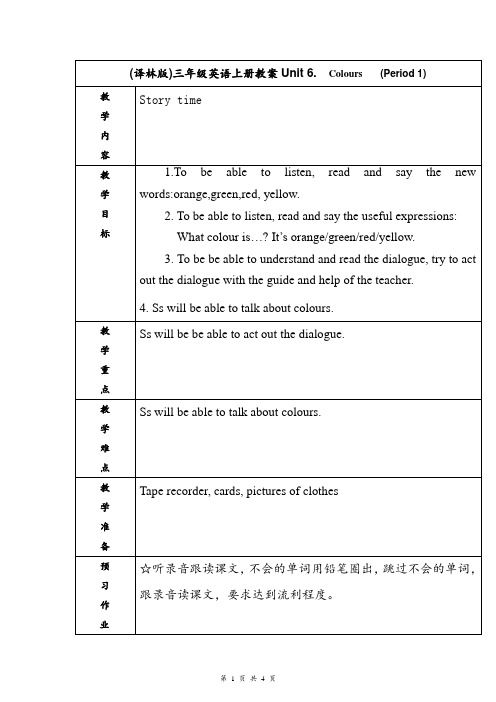
1. Free talk
T: Good morning/afternoon, boys and girls.
T: Look at my skirt. Ss: It’s
Use the drills: Look at my…It’s…to give praise.
2.Show time.
Look at my…It’s nice/great./How nice! / Great!
What colour is my shirt?
Orange, orange,
It’s orange.
2. Take out the different colours of things, talk about them
1.熟读课文1.熟读课文,并背诵。
(译林版)三年级英语上册教案
(译林版)三年级英语上册教案-Unit6 Colours
(译林版)三年级英语上册教案Unit6.Colours(Period1)
教
学
内
容
Story time
教
学
目
标
1.To be able to listen, ቤተ መጻሕፍቲ ባይዱead and say the new words:orange,green,red, yellow.
2. To be able to listen, read and say the useful expressions:
What colour is...? It’s green yellow white orange
It’s red. black blue brown
T: (Take away red card quickly)What’s missing?
Unit6 I’m going to study computer science.Period 1 Section A (1a-2c)

Unit6 I’m going to study computer science.Period 1 Section A (1a-2c)学习目标:1. A: What do you want to be when you grow up ? B:I’m going to be a computer programmer.A :How are you going to do that ?B :I’m going to study computer science.A: What does Cheng Han want to be? B :He wants to be…2. 词汇:grow up, computer programmer, cook, doctor, engineer, violinist, driver, pilot, pianist, scientist3. when 引导的时间状语从句,用be going to 结构对将来的事做出计划。
Step 1 preparationThe words about jobs:___________________(各组同学说出职业名称并写在黑板上。
读出这些职业名称,小组成员互相正音。
)Step 2 presentation1. –What do you want to be when you grow up? –I want to be a computer programmer.2. –How are you going to do that? - I’m going to study computer science.Step 3 practice1. Practice the conversation in the picture. Then make conversations about other jobs in 1a.-What do you want to be…-I want to be…-How are you going to do that? –I’m going to…2. Pairwork Talk about your future intentions.A: What do you want to be when you grow up? B: I want to be…A: How are you going to do that? B: I’m going to …A: Where are you going to work? B: I’m going to …A: When are you going to start? B: I’m going to…Step 4 production1. 1b Listen twice and fill in the blanks. Then match the items.2. 2a Listen twice. What is Cheng Han going to do? Check the correct boxes in the picture.3. 2b Listen twice again. What are Cheng Han’s plans for the future? Complete the chart.Step 5 progress1.---What’s your brother going to_____when he_______up? ----A soldier.A. do; grow B have ; grows C. be ; grows D . play ; grow2. Her father is an ____________in a big factory. A. star B. engineer C. worker D. player3. - ______ are you going to be a pianist in the future ?-I’m going to practice playing the piano every day.A. What B .When C. How D. Why4. There _____an art exhibition this Sunday.A. haveB. is going to haveC. is going to beD. is going to hold5 He is going to to New York with his parents.A. takeB. moveC. bringD. stayUnit6 I’m going to study computer science.Period 2 Section A (2d-3c)学习目标:1.句型:I know why you’re so good at writing stories.How are you going to becomea writer.I’m going to keep on writing stories.Just make sure you try your best.2. 词汇 : be sure about, makesure, college, education, university, article, send3. 重点短语和结构:want to do sth, be going to do sth, be good at, keep on doing sth, make sure, try one’s best to do sth.学习过程:Step 1 preparation:Before reading两人一组交流课前预习情况。
Unit6 Keep our city clean Period1(教案) 译林版英语六年级上册

Unit 6 Keep our city clean(Story time)【教学目标】1.能读单词和词组:air,smoke,rubbish,messy,dead,move...away from,bin,plant, more;掌握句型:What makes...dirty/messy?...make(s)...dirty/messy.以及What can wedo to...?We can...2.能借助问题准确定位到文中的相关语句。
3.能借助朗读符号正确朗读课文,并尝试复述课文。
【教学重、难点】1.smoke,rubbish,messy,dead,move等词的正确朗读。
2.make一词的正确用法。
【教学过程】Activity One Lead in1.Let’s checkT: Did you preview well? Let’s read and check in pairs.设计意图:通过TS互读、互纠、互评,有效检测课前预习情况。
2.Look and sayT:Let’s enjoy some pictures of our city. What can you see?S:.A factory and some streets.T:How do you think of it?S:Many years ago,our city was clean.T:But now, how do you think of it ?S:It’s messy and dirty(指导读单词messy,dirty) .T:What will the dirty city take to us ?T&S:It may cause pollution,disease or even death.So it’s important for us to keep our city clean.设计意图:利用图片,帮助学生集中注意力,引发学生思考环境污染的原因,环境污染带来的后果等。
- 1、下载文档前请自行甄别文档内容的完整性,平台不提供额外的编辑、内容补充、找答案等附加服务。
- 2、"仅部分预览"的文档,不可在线预览部分如存在完整性等问题,可反馈申请退款(可完整预览的文档不适用该条件!)。
- 3、如文档侵犯您的权益,请联系客服反馈,我们会尽快为您处理(人工客服工作时间:9:00-18:30)。
Unit 6 When was it invented?
Section A (1a- 1C) P41
学习目标:
1)掌握重点单词和句型。
2) 能谈论物品被发明的时间、发明者,表达某发明的用途。
Step 1 复习年份的读法、写法
翻译下列年代:
1 nineteen seventy-one____________
2 eighteen eighty-five__________
3. eighteen seventy-six
4.1927_________________
5.1976______________________
6. 2008____________________
7. 2014 ___________________________
Step2 1a
1.invent ________ ( ______ 词)
inventor ___________ ( _______词)
invention __________ (_______词)
2.回答问题
1)Who was the paper making invented?
______________________________
When was the paper making invented?
_______________________________
2)Who was the car invented?
______________________________
When was the car invented?
______________________________
3.背诵对话,并完成1a.
A: I think the TV was invented before the car.
B: Well, I think the TV was invented after the car.
Step3 听力练习
1. 听录音,把发明物和年份相匹配
a. car ________ 1876
puter _________ 1885
c.television _________ 1927
d.telephone _________ 1971
2. 再听一遍,完成填空。
Alice: Was your life very difficult when you were a kid?
Grandma: Oh, not really. Why?
Alice: Well, you 1._____ have modern inventions like a 2. , right? Grandma: 3.______ ____________, we did! How old do you think I am? The telephone was
4.____________in 1876. You need to take a history class, Alice!
Alice: Haha! How about 5. ? They weren’t invented yet, were they? Grandma: Yes, they were. Cars were invented in 1885. My family had a car.
Alice: Well, did you have a TV?
Grandma: No, wecouldn’t afford one. They were 6.____________ in those days. The TV was invented around 1927, I think.
Alice: Well, I know that you didn’t have a 7. because we learned in school that personal computers were invented in 1976.
Grandma: You’re right. But I have 8. now!
Step 4. 课堂训练
1. 单项选择
() 1.—Thank you.I will ask him.
A.gave B.was given C.was giving D.had given
( )2.—________invented the telephone?
—Sorry,I don't know.Let's ask the teacher.
A.What B.When C.Where D.Who
( )3.—When ________ the telephone ________?
—In 1876.
A.did;invent B.was;invented C.were;invented D.do;invented ( ) 4. I think the short story ______by Lu Xun.
A. is writing
B. is written
C. written
D.was written
2.写出下列词的过去式和过去分词。
1. be _________ _________
2. invite _________ ___________
3. drink ________ ________
4. use ________ __________
5. invent ________ _________
6. make ________ __________
7. build _________ __________ 8. stop _________ __________。
